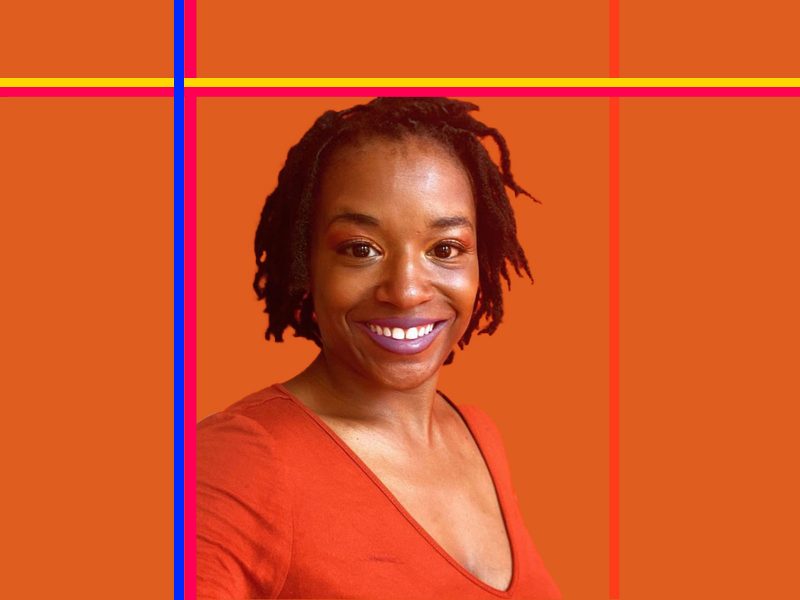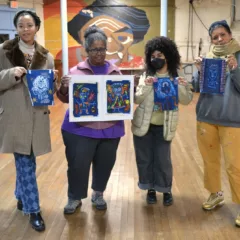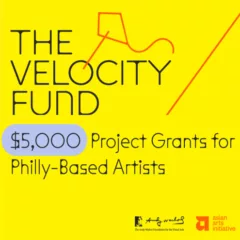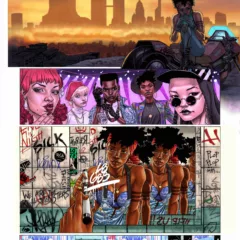
“Wheelz of Life” is a tale created by Sanchel Brown, which focuses on the journey of a boy who is shot by a gun and travels to the underworld, where he gains insight into LIFE and discovers his joy and happiness through rollerskating. The project, conceived of several years ago and a recent Velocity Fund awardee, is coming together through the rollerskating communities in Philadelphia, Camden and elsewhere, and will include local musicians. Roberta spoke with Sanchel on Nov. 4. The podcast interview is 27-minutes long.
Support Wheelz of Life on GoFundMe, check out Sanchel Brown’s website, and follow the “Wheelz of Life” project directly on their Instagram @WheelzofLifeMusical! You can listen to Artblog Radio on Apple Podcasts and Spotify. Thank you to Kyle McKay for composing Artblog Radio’s original podcast intro and outro!
Transcription
[00:00:12] Roberta Fallon: Hi everyone! It’s Roberta, here to welcome you to a special Artblog Radio episode, sponsored by The Velocity Fund. Thanks for joining us today! I’m speaking with Sanchel Brown, performer, dancer, choreographer, Reiki practitioner, life coach, and roller skater; whose project “Wheelz of Life” is a recent Velocity Fund award winner.
Welcome Sanchel! And thanks so much for talking with me today.
[00:00:43] Sanchel Brown: Hi, Roberta. And all who were at the Artblog! It is nice talking to you and I’m happy to be here.
[00:00:49] Roberta: I’m so glad, and we’re very excited to hear about your very busy life and especially about your recent Velocity Fund award for “Wheelz of Life,” a musical on rollerskates. So I’m intrigued about this, and… let’s start right there.
[00:01:08] Sanchel Brown: Yes. So “Wheelz of Life,” as you said, is a musical on roller skates. It is not the first on roller skates, but it is the first that will show a perspective from an African-American narrative. The first was actually “Starlight Express,” which was done in London many, many, many years ago.
But this story follows a young person who is born in Philadelphia, and is raised in a very intense environment, and needs to get the remaining of his tuition for college so that he can go beyond his environment. And in the midst of that, he returns back to the streets to sell drugs, to get his remaining tuition and is sent into the underworld through a gunshot. He does not die, but he learns very valuable lessons and he returns back to his love for roller skating.
So I really wanted to highlight roller skating as a form of healing. I think that Black folks have a lot of innate creativity that we, we just have. And we don’t really acknowledge it all the time. And I believe that roller skating is one of those funnels in which creativity can be put into, in neighborhoods where there aren’t a lot of resources and outlets. And I wanted to show that there is healing power within roller skating, and also reflect what happens after death? What happens after we go to the underworld, or when we are between death and life?
So putting those two things together, I came up with the scripting for “Wheelz of Life.”. And from that everything else was born, the choreography all of the concepts that we have been working with on film, and in person.
So as I’ve been developing it, I’ve been doing it bit by bit. And hopefully soon we will have a full production of this work.
[00:03:00] Roberta: Wow. That is a lot! (laughs)
Now I’m going to try to unpack it, because there’s a lot, a lot of things that you just said- about the content, and why, and also about the production, and how.
And so let’s talk about the concept. I’m, I’m really struck by the idea of a young person connecting with the underworld through a gunshot wound. Does this come out of personal experiences for you, or some people that you know? Or just… can you tell where that storyline came from?
[00:03:39] Sanchel Brown: I would definitely, I’m definitely someone who is very much so connected to the underworld. I do reverence my ancestors. I’m, very much so, learning about what happens in different realms. So it’s, it has been affecting my writing.
And I wanted to have a surreal feeling to the story. I didn’t want to have just a straight through line, that you kind of already know how it’s going to go. I wanted to twist it on his head while also giving some knowledge about some of the things that I have been learning on my own spiritual path. And I think that one of the biggest things that can happen in anyone’s life, that wakes them up, is a near death experience.
Whether people actually die, I have talked to one person who has actually died before, and what she gained out of that really inspired me. And then I’ve also had a near death experience. And I think that’s one of the things that, that can come up. When you, when you go through a near death experience, you are awakened to life in a, in a deeper way, because you understand more, that life is going to eventually end. And that there is more to it.
And I think for me, growing up in America, being in America, now as a mother, and just being in this brown skin, I’m always seeing my brothers in the system, caught up in the system, dying for very, very little reasons, things that don’t even require them to have to go to the other side. But at the end of the day, there’s always a story about “this person got shot” or “this person died.” but we don’t talk about what happens after that. We also don’t talk about how things in our communities like recreation centers, roller rinks combat that!
Also I want to add that I did do youth organizing, community organizing, as a youth. So I did a lot of going to city hall and talking to the mayor to try to get funding for recreation centers, so I definitely understand the depths of how important it is to have an outlet as a young Black person in America.
So, I said a lot, but hopefully that makes sense in terms of where this is coming from, the gut reason of why I, wanted to tell this story.
[00:05:50] Roberta: I think it, it really communicates beautifully what this is about. And now let’s focus on the joy aspect, because you did mention that as well. The near death experience, the getting close to death and how, somehow it makes life more real and brings things to the foreground that are really important, such as joy.
So how is that going to be captured in this? Is there– I don’t want to have a spoiler alert here, but– is there a happy outcome?
[00:06:24] Sanchel Brown: Yes, (laughs) no, no spoiler alert. However, there is a happy outcome. And the journey that Brian takes, he gets a new name. He receives a new name, which naming is very important in terms of purpose and destiny. And he has some fun in the underworld. there will be a section where we incorporate pole dancing and skating.
There will also be a section where he has to face his shadows. He has to face the things that he has thought, said, done, that are not usually done in the light. And as he goes through his journey, he goes from dark to light. He releases a lot of the trauma that comes with, the quote, unquote, being a Black man in America and he comes into his own when he returns back to life and is given another chance to bring his love for roller skating to many generations after.
So yes, it’s going to be a lovely journey where we will go down, we will go up, and we will end up because I’m very… I want to be intentional in this particular project about giving people medicine that they need when they walk away. That they may have felt deeply, but they will walk away feeling uplifted that they will walk away feeling seen that they will walk away feeling heard.
So we will go on a journey, but we will be highlighting joy as a result of learning ourselves and near death experiences.
[00:07:55] Roberta: (laughs) Yeah, I love the running commentary! I love all this context, you’re giving about Brian and getting a new name and having fun, and pole dancing and skating, pole dancing on skates! I mean, maybe this is not an invention of yours, but it sounds pretty inventive. I can’t imagine.
[00:08:20] Sanchel Brown: Yes. A lot of, a lot of these concepts come in dreams. And the, the pole dancing, it came in a dream and I knew, I was like, okay, this is definitely a part of the underworld. So I feel like I get pieces of what’s to come. And then I add them in.
[00:08:35] Roberta: Oh, that’s so amazing. That’s really great. So let’s talk about the production. Because I believe you want to film this, but also have portions of it, or have the production be, live at some point. So how… talk about that a little bit, the filming and the live.
[00:08:58] Sanchel Brown: So the project is broke into many pieces. The final goal is to have a film that will live beyond our physical ability to do the work. But there will also be a live musical component that will be shown next summer in Philadelphia. And that will be as a result of the Velocity Fund as well as the Philadelphia Trade School. And we are going to be doing a work in progress, live showing outdoors, with all of the sounds, and we will have some elements of film incorporated in the live performance as yes, probably projected at some point in the work. And maybe sometimes projected simultaneously, while the work is happening.
So the films that will be shown during the live performance are being created right now. And we are making short vignettes of some of the original sound score and skate-ography (we call it skate-ography) that will be presented in the film, and also put onto social media as sort of a campaign to get the word out about the project.
And for that particular portion of the project, I will be working with international skaters. So I’m working with some skaters this year from London. And hopefully we will have some from California, Chicago, Detroit, I’m looking to work with folks who were in very skate heavy scenes where I can really learn more, and we can make these connections because there is a difference between the international and national skate scene.
There’s some slight differences. And I want to be able to film, create the vignettes and incorporate that into the live performance. And all of the process. And some separate filming will happen with some of the material from the live performance. That will be incorporated in the final film, if that makes any sense.
[00:11:01] Roberta: Very cool. Yes. So talk about the music! In the list of what you do performer, et. cetera, a dancer choreographer, I didn’t put in musician or composer! So who’s composing the music, is that you as well?
[00:11:18] Sanchel Brown: Yes! Well, I wouldn’t… I’m not skilled in putting sheet music together. But I will be working with someone to help me create sheet music. Right now I’m working with the musical director, Taylor Samuels. We have done some projects in the past together. She’s a very marvelous Music Director and w we’re working together to create the scoring.
But I did write all of the music, and… I would not have considered myself a song writer beforehand. I just wrote from the heart. But when I started to create the musical, the music just came and I would just write it down.
In the last iteration we had Derek Ford as the Music Director, and he helped me flesh out a lot of the ideas so that the work can be more cohesive to music language, because I speak like a dancer. (laughs) I count in eights; musicians count in fours. It’s just a different world. So I have been working with some people who are a little bit more music savvy to get the music tight. And yeah, it’s just been coming from the heart.
And a lot of. Inspired from other musicals that I have worked on. And then other musicals that I really love. One of them that has really inspired this project is “The Wiz.” Mainly because “The Wiz” is is such an original musical. It’s based off of The Wizard of Oz, but the set design costumes, the music, it’s just so original. So I really wanted to tap into that energy when I was creating the music and… Here we are.
[00:12:50] Roberta: It sounds marvelous. I just want to say, put me on your mailing list for that summer outdoor performance, please.
That’ll be great. I can’t wait. All right. So. Let’s talk about your own experience with roller skating. Did you roller skate as a child? How did you learn?
[00:13:12] Sanchel Brown: Yes. I loved roller skating as a child. It was one of the only things my mother would really let me do. She was very, she was a stricter parent in a lot of ways and she didn’t really let me go to parties and things. So roller skating was my way to kind of get the party feel, but it was a safe environment.
And on top of that is movement, and me being a dancer anything that requires movement, I tend to really enjoy. So roller skating was an outlet for us to do on the weekends, We would go roller skating and we will be there all night, as long as we could be there until it was time for us to leave. And as an adult, whenever my birthday will come around, I would always have a feeling like I need to be at the roller rink. Like it was just always this feeling like I want to go roller skating. Didn’t matter how old I was, even in college and beyond.
And it wasn’t until maybe years later where I went rollerskating in Atlanta, Georgia to their, one of their more famous Roller Rinks called Cascade, where I got the idea, when I was there, and I was thinking about choreographing a piece on skates.
And then from there I fleshed it out. Cause I was like, well, “what about…” cause the music is so important in a roller rink.. That’s one of the next second, most important… other than the floor. Cause skaters are very picky about the floor! (laughs) The DJ is so important. So I thought about music and um, from there I was like, “Ooh, I would love to like create my own music” and the, the concept just built off of that.
So it was always been from my own passion, the things that I would do on the weekends as a child. And then as an adult, trying to upgrade my roller, my rollerskating skills from being a child to, you know, spinning on wheels and doing all kinds of things. So it’s, it’s, it’s levels to this and I’m still learning and growing.
[00:15:06] Roberta: Wow. Talk about the floor, cause I hadn’t heard that before, that roller skaters are very particular about the floor. That sounds like dancers to me.
[00:15:14] Sanchel Brown: Mm.
[00:15:15] Roberta: I would think dancers are also very particular about the floor.
[00:15:19] Sanchel Brown: Very yes, very much so similar. (laughs) The roller skates that we, that we use have rubber wheels. They do very well on wood floors and they can do well outside, but you may need to have a different kind of skate. I have, I actually have a pair of outside and inside skates. I consider myself a real skater now because both grounds require different material and different things.
And yeah, if there’s wet ground, then it just, the rubber just absorbs the wetness. So it doesn’t really work effectively when you have any kind of wet ground, any kind– of course, like not carpet or anything like that. That’s going to slow you down.
So yeah, skaters are very particular about the leveling of the floors, everything level, because we can feel everything when we’re skating and we’re moving around the space. And again, that wasn’t something I learned until I started doing this project.
[00:16:15] Roberta: So where do people, where do you, rollerskate indoors in Philly?
[00:16:21] Sanchel Brown: I rollerskate, luckily I have a residency at the CEC, the Community Education Center in west Philly
[00:16:26] Roberta: Sure.
[00:16:26] Sanchel Brown: And that was, that was a big ask (laughs) because had to ask if she would allow me to use the wooden floors for skating and it actually worked out, it has been working out. We did a “stage and skate” reading at the CEC and it was really effective.
So sometimes I practice there. Um, Sometimes I actually go to the roller rink. I don’t actually go in Philly. I go to a roller rink in Camden. And I get, get it in there. And sometimes I’m just outside. Sometimes I’m outdoors in different locations. And of course I use my different skates for that.
But those are like the main places I go to as of right now to do a lot of my own skating. And sometimes tennis courts, tennis courts are also a really good place to go roller skating.
[00:17:15] Roberta: Yeah, their level, I would think, but they, they’re not wood.
[00:17:19] Sanchel Brown: It’s not wood. And it’s not concrete, but whatever material that they use, it works (laughs) for rollerskating.
[00:17:27] Roberta: Okay, good to know. All right. Let’s talk about connections between what you’re doing and people, because I know that’s a big part of why you’re doing this. It’s… you’re a people person, right? And a connector. So explain the thrust of “Wheelz of Life” through that lens.
[00:17:47] Sanchel Brown: Yeah. So this is a very large project that I cannot do on my own, and the connections that I have made have been made over the years. I had the, the idea by myself, and then a year later I met India Hyman who too was connected to Great on Skates in Philadelphia. We partnered up and I started taking her classes and started telling her about the idea.
And then she bought in more skaters. And really, we started to build our own community in a sense. Shamar, he, uh, is a very talented skater on wheels. He can spend like a hundred million times on wheels. India connected me to Shamar and a couple other skaters.
And then as I started to go to the roller rinks, I started to meet people. And it’s funny because. Some people from Baltimore had migrated, started migrating to Camden to go roller skating. And I would see those were the same people that I was skate when I was coming up. So it’s been like a lot of full circle moments.
It’s also been meeting a lot of people at the roller rinks and meeting people in the roller skating classes. And then also in terms of other portions of the musical, like the music director, and then the band, because we had abandoned our last iteration. These were people I met from different portions of my theater life.
So they started to come into play. Derek was one of those people. He brought in his brother, David, and then we have I like to call Kevin Lee– Kevin Lee, he does the guitar playing in the band– I call him the guitar slayer.. He bought his band into play, so it really starts from like me having one connection and then I get with other communities and I have been tapping into. communities, that I usually… in networks that I usually don’t have access to through the Philadelphia thing, through Velocity grant, that has opened me up to other more technical portions of it that I may need.
Funding of course is important. So it’s, it’s been slowly but surely graduating into a big tribe of skaters. And, and others who wants to see this vision come to life.
So yeah, community is very much so important and in the skate world, and then also in this project,
[00:20:09] Roberta: That’s amazing! It’s… you’ve got a great network, it sounds like.
[00:20:12] Sanchel Brown: Yes.
[00:20:13] Roberta: Terrific. And thanks for raising the issue of funding because anyone who’s making a movie– and Philly has a big movie scene, you know, there’s Blackstar Film Festival and The Latino, and the Asian American Film Festival; The Philadelphia Film Society, People here make movies– and so everybody needs funding.
And it’s a big issue because there are a lot of moving parts and you want to pay people, right? So I know Velocity, Velocity is kickstarting your project, but are you doing other fundraising? GoFundMe, or crowdsourcing, that sort of thing?
[00:20:51] Sanchel Brown: Yes, we have a GoFundMe page that is connected to our Instagram. You can, anyone can donate at any time there. We also have been doing, I have been filling out a lot of grants, a lot of grants, and residencies. Luckily before we got the Velocity Fund, we were featured at Movement Research in New York city.
And then we also received some funding from the Philadelphia Trade School. So we’ve been, slowly but surely, getting the funding that we need. I’m waiting for a very, very, very large grant that would help a lot, fingers crossed and prayers up. But yeah, I’ve just been putting in a lot of applications, anything that people hear and they kind of send it to me.
I will put in applications, but before that, I was paying people out of pocket. I mean, it wasn’t a lot, but I just, I’ve always made sure that whoever I work with gets something. Okay, I’m going to give you attention soon (laughs)
So yeah, it’s, the funding is real and… it’s been an aspect of my, of me working with others. I’ve always tried to make sure that people get something from working with me. So now actually having the funding, I can pay people properly and, you know, people work better when they know they’re gonna really get paid for what they’re going to do.
I’m grateful to start receiving the funding and getting the kind of.. eyes on the project. I think once people know about it, they get excited, in general, and they want to see it happen. Now it’s just getting, you know, more momentum around it and seeing other ways in which we can be resourceful and also get funding.
[00:22:31] Roberta: Yeah, no, I hear you about the funding and it sounds like you are connected with funding sources, and I’m really hopeful for you to get this funded, so that next summer there can be this multimedia live and filmed performance in the park.
Or is it even a park? Where’s it gonna be?
[00:22:50] Sanchel Brown: I’m not sure yet. I would love to do it in a, I’m hoping to do it in West Philadelphia. There’s an organization over there called Skate University, which could be a possible space. I want it to be a space where community can come, everyday people can come, people who usually would not be able to see theater. So we are still working on location.
[00:23:11] Roberta: So talk about being a mom and doing all this. Because, you are a mom, and you are also a choreographer, and all other things– life coach– and you have this big, project. So how’s it going? And you’re just, you some traveling with your daughter, Yeah. yeah.
[00:23:37] Sanchel Brown: Yes, I just left tour with my daughter. My daughter is 19 months and she was in my stomach when I started writing the music, and she has been a part of all parts of the development of the work. And it has been, it has been challenging as you see right now, trying to keep quiet (laughs) But also, it has a lot of fun because it’s a fun environment for her as well. So she’s learning a lot and I’m learning a lot.
It is a lot of elements that come into traveling as a mother, especially with babysitting and nannying and having car seats that you have to rent in every city and… it’s planning on a whole nother level.
So she’s helping me stay on top of my game for sure. (laughs)
[00:24:23] Roberta: So how young can… Or how old does she have to be before you put her in her first set of skates?
[00:24:31] Sanchel Brown: I’m hoping I can do it when she turns two next year, at least get her in those little starter skates that they have at the roller rinks that look like ducks. I’m hoping that she can get a pair of skates in a couple of months. So we’ll see how it goes.
[00:24:47] Roberta: Well, fingers crossed.
[00:24:48] Sanchel Brown: Yes.
[00:24:50] Roberta: This has been a wonderful conversation. And I wonder if you like to leave us with some parting words, something we haven’t covered, or some other aspect of anything you’re doing that you want to raise?
[00:25:01] Sanchel Brown: Well, I just want to say thank you to the Artblog for having me. Thank you, Roberta, for having me on. I really do appreciate being here. And I would love for people to follow the work, at www.SanchelBrown.com, you can also specifically follow this project on Instagram, @WheelzofLifeMusical.
And I just ask that you spread the word about what’s happening, once we begin our social media campaign. And if you can donate, or if you know of any funding, I’m open to all of those things.
And I also just want to leave a word for those who are trying to create work out of, out of nothing. The most important thing is that you have the work and that you are dedicated to that. And you are invested in that as if you’re being paid the multimillion dollar checks that you desire, possibly. But just to keep going, just to keep going and all of the other things will fall into place.
[00:26:02] Roberta: Wonderful advice, everybody, you should take Sanchel’s advice. Thank you so much. I’ve been speaking with Sanchel Brown, dancer, performer, and writer and creator of Wheelz of Life, the musical on roller skates, which is coming to a neighborhood near us somewhere next summer, at least in part.
So thank you Sanchel . And this podcast was made possible through the Velocity Fund. So thank you to the Velocity Fund.
Bye Sanchel!
[00:26:40] Sanchel Brown: Bye bye!









